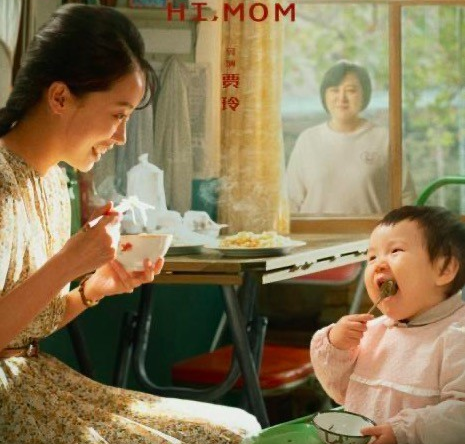On the first day of the Chinese New Year, the movie "Hi, Mom" directed by Jia Ling, made some people laugh and cry.
The movie, adapted from a sketch comedy, was Jia Ling's directorial debut. She created it in memory of her mother, Li Huanying, who passed away unexpectedly. She put all her efforts into making it.
Most of the emotional scenes in the sketch were based on Jia's personal experience. Born in 1982, she is from Yicheng, Hubei Province. At the age of 19, she had just entered college for one month, receiving a phone call saying her mother had passed away.
After she became famous in an interview, Jia talked about this problem: her mother left before she couldn't see her dream come true, even watch her perform.
On the day the movie was launched, she posted on her Weibo account: "Three years of preparation, launching today. Some regrets are unavoidable. I always wanted to get all my heart desired. What a privilege to be able to do it again."
Every time she mentioned her mother, Ling could not help crying as her mother's departure was an unfortunate event. Many nights she remembered her mother's appearance. The more you watch the movie, the more you will feel how funny it was at the beginning, then how much sorrowful in the ending it was.
Children want to support and honor their parents, but they are no longer alive to receive the honor. I am afraid that it is not only Jia Ling's most challenging obstacle in her life but also ours.
"The trees long to be still, but the wind blows nonstop, the son wants to honor the parents, but they will not remain forever." No sentence is more painful than this. This sentence first came from the eighth chapter of "Confucius' Family Sayings, Volume 2, Zhisi 8". It was also stated in Volume 9 of "A Biography of Han Poems" (Wenjing Jin compiled by Han Ying in the Han Dynasty). Therefore, later generations use "the sadness of wind trees" as a metaphor for grief. It means that the tree wants to be still, but the wind keeps swaying it; the children want to provide support to their parents, but their parents are not alive to receive this support and have passed away. If the wind doesn't stop, it's the tree's helplessness. If the parents are not there, it's the children's endless sorrow.
After watching the movie, I wondered what my parents looked like when they were young and their life experiences. They endured all kinds of hardships to raise their children and sacrifice too much for them. They were once adolescents and also had their youth.
"When parents are alive, one still has an origin; when parents go, there is only a way back in life." This sentence is so real and heartfelt.
It would be interesting to participate in our parents' life experience in their youth and spend some time with them.
In real life, we see such reality: Your parents give you too much, you give your parents too little, they are willing to give you all, but they never want you to repay, they always pay attention to you, worry about your growth, worry about your marriage as well as cheer for your work. When your parents miss you, they shed tears, but they always smile, afraid you worry about them when they see you.
We need to remember that when our parents are alive, no matter how old we are, we are still children; when our parents die, our families will be separated, and we will be orphans.
This movie reminds us to be children: filial piety should be done as early as possible, the earlier, the better, no matter how much hardship we go through or how tired we are, no matter how much difficulty we face or how poor we are, we should remember to treat our parents well. We shouldn't wait; we can't afford to wait. Don't wait until the bitter days are over, and your parents are already old, and the happy days have just begun, but your parents are gone!
We need to know that parents get old when we least expect it. As children, we should not be stingy to express our love. In the limited days we have with them, I hope you can go home and have a look. If your work does not allow it, remember to make a phone call to show care.
There is a kind of love that is called "The tree may wish to remain still, but the wind blows nonstop; there is a kind of pain called, "the son wants to honor the parents, but they will not remain forever."
While there is still time, you should learn to love them as they love you!
- Translated by Nonye Nancy












